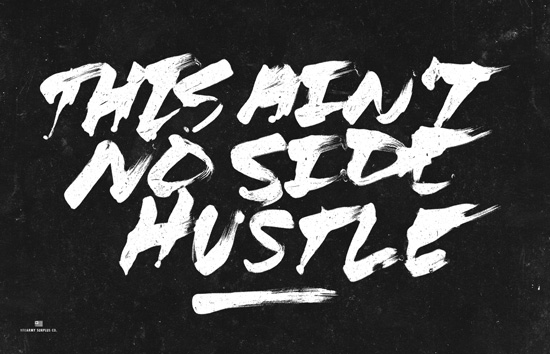
This Ain’t No Side Hustle.
By Neuearmy. Resolutions: 1280 × 800, 1440 × 900, 1680 × 1050, 1920 × 1200, 2560 × 1440, iPhone, iPhone 5, iPad.
Download here.
Last week I started watching Orange is the New Black (great analysis here why it’s revolutionary), only to be introduced to the effortlessly cool and inevitably magnetic character of Alex Vause.
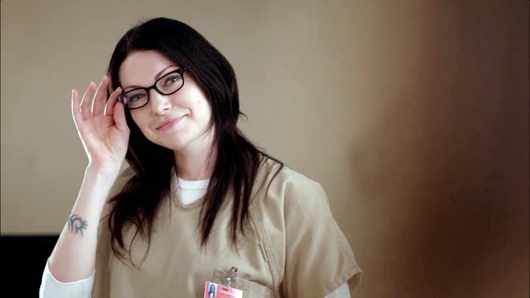 Khakis have never looked this good.
Khakis have never looked this good.
Philippine Speculative Fiction 9 is out! Includes my story “Anthropomorpha,” which I still can’t pronounce correctly unless I’m looking at the word.
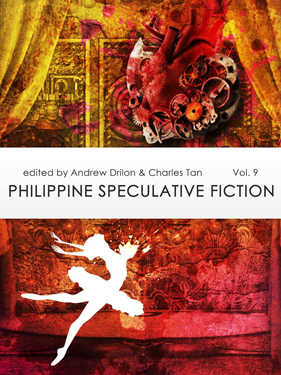 Book blurb: A young tikbalang auditions at the country’s largest TV station; a priest travels the universe to officiate sacraments in outer space; a murdered girl returns unscathed to the home of her perpetrators. The Philippine Speculative Fiction series showcases the rich variety of Philippine literature. Between these covers you will find magic realism next to science fiction, traditional fantasy beside slipstream, and imaginary worlds rubbing shoulders with alternate Philippine history—demonstrating that the literature of the fantastic is alive and well in the Philippines.”
Book blurb: A young tikbalang auditions at the country’s largest TV station; a priest travels the universe to officiate sacraments in outer space; a murdered girl returns unscathed to the home of her perpetrators. The Philippine Speculative Fiction series showcases the rich variety of Philippine literature. Between these covers you will find magic realism next to science fiction, traditional fantasy beside slipstream, and imaginary worlds rubbing shoulders with alternate Philippine history—demonstrating that the literature of the fantastic is alive and well in the Philippines.”
It’s available in the following stores, with the editors saying there’s more in the pipeline coming:
Here’s an excerpt from my story:
Luz found out what she really was when she was young and she quickly developed a habit for when her parents left her in the house alone. When the house was emptied of them, of their sapienness, their rationality and their even keel, it felt just about right. Everything dropped its act. The mirror stopped pretending it wasn’t looking at Luz, the TV stopped pretending it wasn’t judging her. In moments like these, Luz’s heart unmoored from its usual place of screwdrivered tightness.
Luz would take the back door close to the kitchen that led to the basement. No one in her family cleaned these parts. She found her mouth full of cobwebs and a beetle on her face. The door closed behind her in the dark, rust singing, shutting off the only source of light. In the dark, she began to strip. Slippers, shirt, underwear. The dust and filth on the concrete stairs crept into the webs of her toes. She folded her clothes and left them on the top step as she went down.
Not yet, not yet. Too narrow. Too close to the surface, the neighbors will hear. The anticipation consumed her, like the energy and desire that accompanies a smoker returning to her cigarette after an attempt to quit.
…
At first Luz thinks it’s her stomach reacting to the fish smell and going haywire, but it’s not, it’s something more alarming. It’s familiar. It makes her think of milkfish and mangoes, someone nearby burning wood. Seaweed on the shore, like a mermaid’s hair, the saltiness of beach country. Hayop nga tag-as, walay tiil o kamot, magkamang sa yuta gamit ang himbis sa tiyan, pagkiway-kiway o pagtuyhakaw sa lawas, a laugh, someone pulling a drink from a beer bottle, halas, halas. A tokay gecko squashed by a rock, its speckled green-and-orange body almost perfectly fossilized, knobs on its skin.
URSULA K. LE GUIN, The Left Hand of Darkness
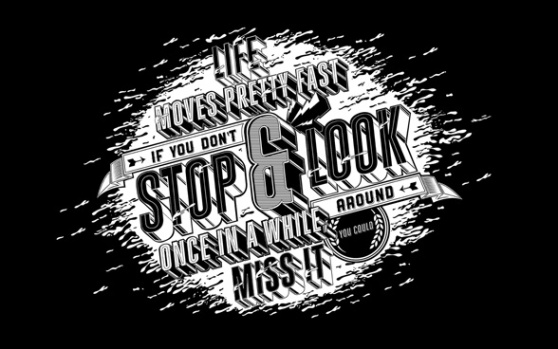
“Life moves pretty fast. If you don’t stop and look around once in a while, you could miss it.” – Ferris Bueller
By Ben Johnston. Resolutions: 2880 x 1800, 2560 x 1600, 1920 x 1200, 1680 x 1050, 1440 x 900, 1280 x 1024, 1280 x 800, iPhone, iPad.
Download here.
What could sound better than one excellent guitarist doing the job of a band (treble, bass, rhythm) by himself on a beautiful steel acoustic?
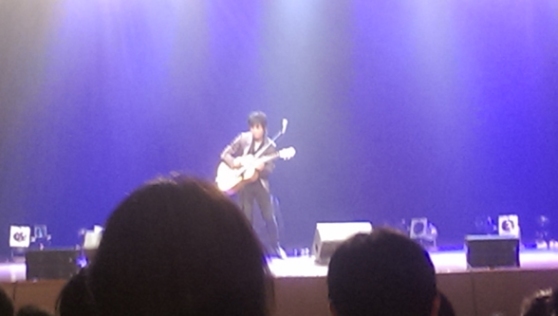
A guitar and ukulele duet with an intro done entirely on palm mute before escalating into full call and response. YES.
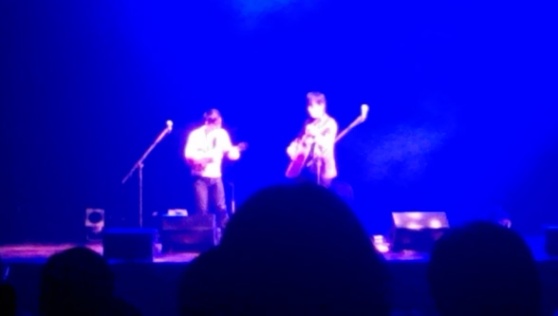
Kotaro Oshio and Jake Shimabukuro tonight at AC Hall. What a ride. STRING PLAYERS RULE SO HARD.

Uploaded by lord0pichacu. 1920 x 1080. Download at Wallhaven.
I went to a launch before for a book I was part of and each author had to say something. A woman before me went up and told us that the reason she got into writing was that she wouldn’t have to speak.
Everyone burst out laughing. I’d eventually get to know many of the authors there a little better and I think I can safely say that for most of us, if we had something meaningful to say, we’d rather do it in the corner of a room. With you not in the room. And after weeks of writing, editing, and self-flagellating, we’d give it to you and you’d read it, hopefully with us already having left the room.
In terms of writing, that’s what I’m used to: my not having to be there when I speak to you. That I don’t have to be part of the performance.
I went to a storytelling workshop last Wednesday in Sheung Wan called Good Bones: Advanced Structure and Form, led by Scott Whitehair as part of HK’s StoryWorthy Week. It was on oral storytelling – which means I don’t get the corner of the room or the weeks of self-flagellation. I only get a minute to think and then five minutes to tell the audience a story, with a beginning, a middle, and an end.
The workshop was focused on plot structures. They weren’t new to me, given that I teach creative writing for the dayjob, but what was new was my having to be part of my own performance. And it’s still different from playing the guitar – as much as I like improvising onstage when I play, there’s still a degree of distance between myself and the guitar that makes the music. You don’t get a shield like that in oral storytelling.
It’s pretty wonderful to look at something you’ve been doing for years and years from a different angle that makes you feel like a beginner all over again. That’s one of the things Scott reminded us in the workshop: 1. no one’s a natural. At least the way most people understand “natural” – as if someone was born with the innate sense of knowing how to do a particular thing. I think at most we might get an innate sense of extrapolating from what we have learned, but every single one of us still had to put in the years of practice before we reached the level of knowing how to do it in our sleep. When you see someone you think is a natural at doing something? She’s put in the hours to make it look like she’s one.
That’s the other thing: 2. part of the craft is hiding the craft, but the craft is still there. This was brought up in the workshop when we were talking about openings, when you’re in front of an audience and you say your first word. A lot of people choke and start with, “So, yeah, so last week I was walking down the road when…” That So there in the beginning – you’re trying to pass it off as something off-the-cuff and unprepared so you can’t be criticized for it. You’re trying to bypass the vulnerability of showing that you care enough to have crafted an opening. I think Scott said something really true when he said that storytelling is a series of conscious decisions. This is easy enough to see when you’re writing on paper, but when you’re in front of an audience with no paper to shield you from them, it’s good to be reminded that it’s OK to be fully conscious of what you’re doing. If you act cool and defensive, no one’s going to care about your story. Why should they when you already don’t?
3. You can’t force the connection between the audience and the story. You can only try to make that happen by influencing what you can control: the separate audience and the separate story.
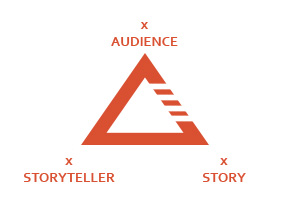 I think I tend to forget this when I’m writing – I end up overplaying the theme, forcing my characters to twist themselves into unnatural poses so they can fit into the machine I made for them. That’s why nowadays I deliberately make myself not think about the ending; it has to come organically, as consequences of my characters’ actions. If the consequences don’t fit the theme? Then obviously I’ve been writing a different story all along and I have to make myself open to that idea with a whole lot of rewriting.
I think I tend to forget this when I’m writing – I end up overplaying the theme, forcing my characters to twist themselves into unnatural poses so they can fit into the machine I made for them. That’s why nowadays I deliberately make myself not think about the ending; it has to come organically, as consequences of my characters’ actions. If the consequences don’t fit the theme? Then obviously I’ve been writing a different story all along and I have to make myself open to that idea with a whole lot of rewriting.
I think this concepts extends also to much of life. There are a lot of things we can’t control, but there are other things that you can. And that’s where you should be focusing your energies on, not on your impossibilities. “At the head of all understanding – is realizing what is and what cannot be, and the consoling of what is not in our power to change.” Solomon ibn Gabriol.
Ending this as the workshop ended – with the words of another great man:
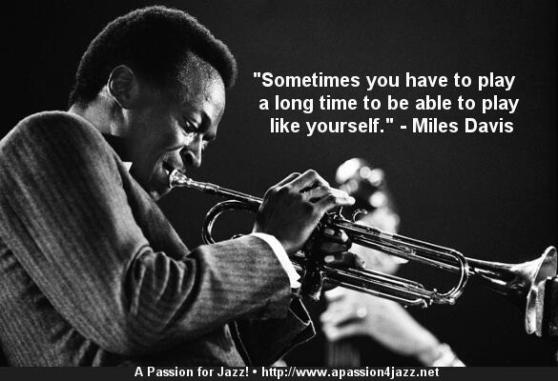
DAVID BAJO, The 351 Books of Irma Arcuri

Inspiration exists but it has to find you working. – Pablo Picasso
By Daniel Patrick Simmons. Available resolutions: 1280×800, 1440×900, 1680×1050, 1920×1200, 2560×1440, iPhone, iPhone 5, iPad. Download at The Fox Is Black.